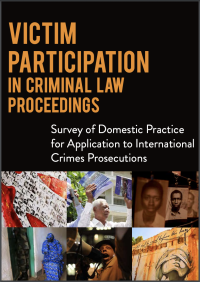Publications
REDRESS’ publications are also available in hard copy format. Please contact us for further information on [email protected].
On 25 November 2015, REDRESS and partner organisations made a submission to the Secretariat of the International Conference for the Great Lakes Region. The submission describes how far Uganda, Kenya and the Democratic Republic of the Congo have worked against sexual violence against women and girls and outlines areas for improvement. These three countries together with eight other African countries signed a joint declaration to prevent sexual violence, end impunity and provide support to victims (known as the Kampala Declaration). The implementation of this declaration will be reviewed in December 2015. Our submission aims to provide input to that review.
REDRESS submitted written evidence to the House of Lords Select Committee on Sexual Violence in Conflict. The Committee is looking into the UK’s practice and policy concerning prevention of sexual violence in conflict. The submission emphasises victims' needs of holistic support services. It also calls for the investigation and prosecution of sexual violence in conflict at the national international levels, including abuses committed by peacekeeping troops. In 2014, REDRESS participated in the expert meetings at the Global Summit to End Sexual Violence in Conflict held in London and was also part of the expert group providing input into the International Protocol on the Documentation and Investigation of Sexual Violence in Conflict, which aims to support more effective investigations, prosecutions and justice for victims.
REDRESS' submission to the Universal Periodic Review of Sudan focuses on developments since 2011, and the urgent need to carry out thorough reforms of Sudan’s legal and institutional framework and practice to ensure the effective prohibition of torture or other cruel, inhuman or degrading treatment or punishment. This submission is based on our extensive work on torture in the region, including representing and assisting individual survivors of torture in proceedings before national, regional and international bodies, and advocating for legislative and institutional reforms.
This report, authored in partnership with the Institute for Security Studies (ISS), provides a detailed study of domestic practice of victim participation in criminal law proceedings. It analyses victims’ rights to engage in criminal proceedings and in particular the extent to which a range of domestic jurisdictions provide victims with rights to play an active role. Such rights may include the right to launch proceedings, to challenge decisions not to prosecute, and to make statements in court. The aim of this report is to support the efforts of states to develop and put in place a framework for victim participation in the context of investigating and prosecuting international crimes. This report aims to be a useful reference for actors in domestic systems engaged in wider discussions on victims’ rights.
This submission to the UN Human Rights Committee, authored by REDRESS is collaboration with other civil society organisations, outlines key concerns in relation to Kenya’s adherence to the prohibition of torture. This submission may be used by the Committee to frame the list of questions Kenya should address in its upcoming report to the Committee. We highlight the need for Kenya to adopt the Prevention of Torture Bill, which includes a comprehensive definition of torture in line with the UN Convention against Torture, and renders all acts of torture punishable by appropriate penalties. Kenya must also be encouraged effectively investigate the 2007-2008 post-election violence, and address the ongoing impunity of perpetrators by removing domestic obstacles preventing victims from obtaining justice and reparation.
In these comments, Amnesty International, the Community Empowerment for Progress Organization (CEPO), the Enough Project, Human Rights Watch, South Sudan Action Network on Small Arms (SSANSA) and REDRESS highlight several key concerns regarding the draft National Security Service Bill of 8 October 2014 of South Sudan. The Bill was originally tabled before the National Legislative Assembly (NLA) in May 2014. The third reading took place on 8 October 2014. While some positive changes were incorporated into the Bill, the organisations remain concerned that it would give the NSS broad powers, without sufficient oversight and safeguards against abuse. Therefore, they call on members of parliament to vote against the Bill during the final reading and to make further amendments to bring it in line with South Sudan’s Constitution and with regional and international human rights obligations.
This brief, prepared by REDRESS and the African Centre for Justice and Peace Studies (ACJPS), outlines the main concerns of the organisations in relation to Sudan's implementation of the International Covenant on Economic, Social and Cultural Rights (ICESCR).
In this briefing paper, the Uganda Victims Foundation identifies the categories of victims, types of interim support needed, processes necessary to meet the reparative needs and proposed time frames that the government policy should target for interim reparations. UVF is mindful that the government has to mobilise resources if it is to meet these interim needs, however it must be recognised that the categories of victims listed herein have lived in inhuman and degrading circumstances from the time of their victimisation until today and hence there is a clear need for urgent intervention. We hope that this Briefing Paper may constitute a useful point of departure to discuss and implement interim measures and thus assist the many victims of the conflict in Uganda.

